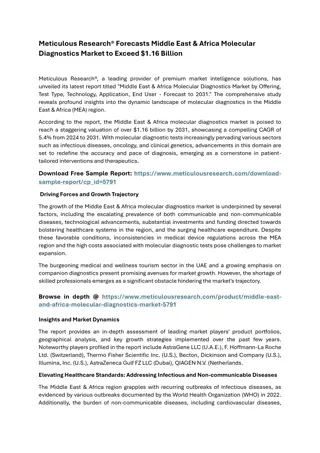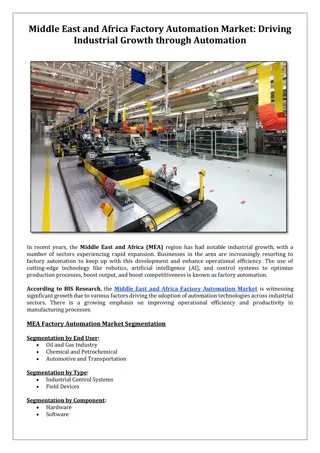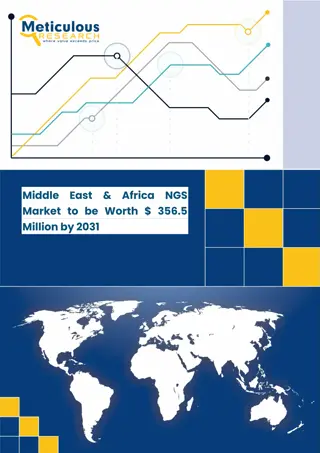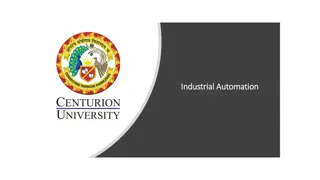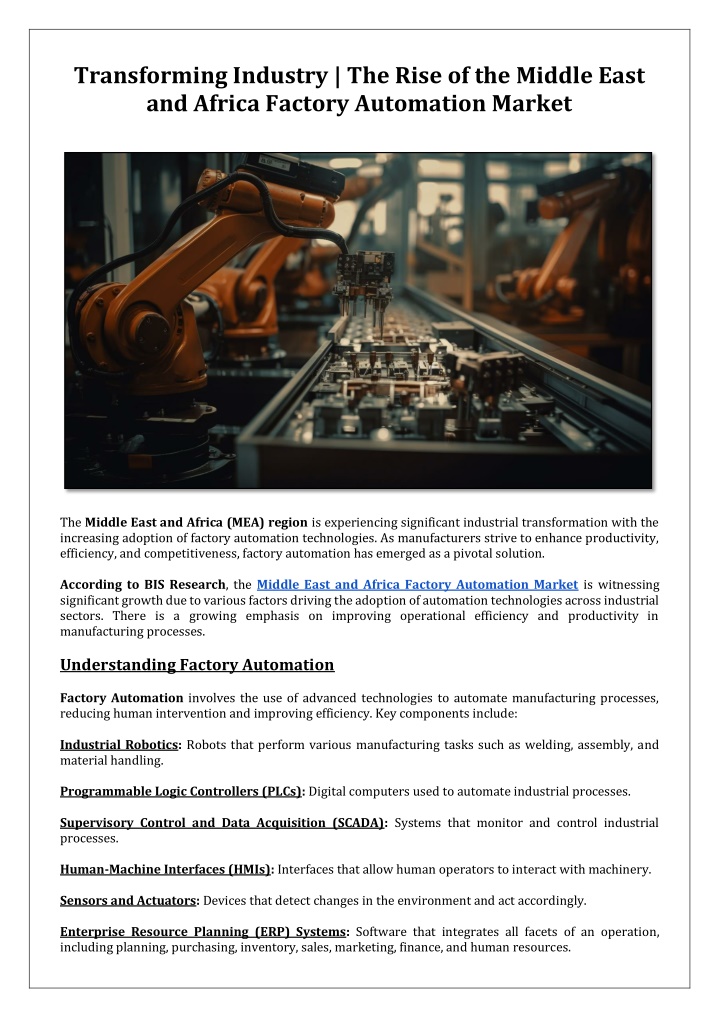
Transforming the Rise of the Middle East and Africa Factory Automation Market
According to BIS Research, the Middle East and Africa Factory Automation Market is witnessing significant growth due to various factors driving the adoption of automation technologies across industrial sectors. There is a growing emphasis on improving operational efficiency and productivity in manufacturing processes.
Uploaded on | 10 Views
Download Presentation

Please find below an Image/Link to download the presentation.
The content on the website is provided AS IS for your information and personal use only. It may not be sold, licensed, or shared on other websites without obtaining consent from the author. If you encounter any issues during the download, it is possible that the publisher has removed the file from their server.
You are allowed to download the files provided on this website for personal or commercial use, subject to the condition that they are used lawfully. All files are the property of their respective owners.
The content on the website is provided AS IS for your information and personal use only. It may not be sold, licensed, or shared on other websites without obtaining consent from the author.
E N D
Presentation Transcript
Transforming Industry | The Rise of the Middle East and Africa Factory Automation Market The Middle East and Africa (MEA) region is experiencing significant industrial transformation with the increasing adoption of factory automation technologies. As manufacturers strive to enhance productivity, efficiency, and competitiveness, factory automation has emerged as a pivotal solution. According to BIS Research, the Middle East and Africa Factory Automation Market is witnessing significant growth due to various factors driving the adoption of automation technologies across industrial sectors. There is a growing emphasis on improving operational efficiency and productivity in manufacturing processes. Understanding Factory Automation Factory Automation involves the use of advanced technologies to automate manufacturing processes, reducing human intervention and improving efficiency. Key components include: Industrial Robotics: Robots that perform various manufacturing tasks such as welding, assembly, and material handling. Programmable Logic Controllers (PLCs): Digital computers used to automate industrial processes. Supervisory Control and Data Acquisition (SCADA): Systems that monitor and control industrial processes. Human-Machine Interfaces (HMIs): Interfaces that allow human operators to interact with machinery. Sensors and Actuators: Devices that detect changes in the environment and act accordingly. Enterprise Resource Planning (ERP) Systems: Software that integrates all facets of an operation, including planning, purchasing, inventory, sales, marketing, finance, and human resources.
Key Market Dynamics Several factors are driving the growth of the factory automation market in the MEA region: Technological Advancements: - Innovations in robotics, IoT, AI, and machine learning - Enhancing capabilities and efficiency of automation systems Government Initiatives: - Promotion of industrialization and smart manufacturing - Supportive policies and investments by regional governments Economic Diversification: - Investment in non-oil sectors by Middle Eastern countries - Boosting demand for automation in manufacturing, especially in the GCC Increasing Demand for Quality and Efficiency: - Adoption of automation to improve product quality - Reduction of production costs and increase in efficiency Labor Cost and Scarcity: - Rising labor costs driving automation adoption - Scarcity of skilled labor in some parts of the region prompting automation use Want to gain a competitive edge over others? Request for a FREE Sample Report on Middle East and Africa Factory Automation Market Research. Middle East and Africa Factory Automation Industry Segmentation Segmentation by End User: - Oil and Gas Industry - Chemical and Petrochemical - Automotive and Transportation Segmentation by Type: - Industrial Control Systems - Field Devices Segmentation by Country: - South Africa - Saudi Arabia - Egypt - UAE - Rest of Middle East and Africa Future Market Prospects The future of the factory automation market in the MEA region looks promising, with several trends likely to shape its trajectory: Expansion of IoT: Increasing adoption of IoT devices will enhance connectivity and data collection in manufacturing processes. Advancements in AI and ML: Continued innovation in AI and machine learning will improve predictive maintenance, process optimization, and decision-making.
6G Technology: The deployment of 6G networks will enable faster data transmission and real-time communication, enhancing the capabilities of automated systems. Focus on Smart Manufacturing: Growing emphasis on smart manufacturing and Industry 4.0 will drive the adoption of advanced automation technologies. Conclusion The Middle East and Africa Factory Automation Industry is poised for significant growth, driven by technological advancements, government initiatives, economic diversification, and the need for efficiency and quality in manufacturing. By addressing challenges related to costs, workforce, infrastructure, and cybersecurity, and leveraging opportunities in technological innovation, government support, and sustainability, the potential of factory automation can be fully realized.




